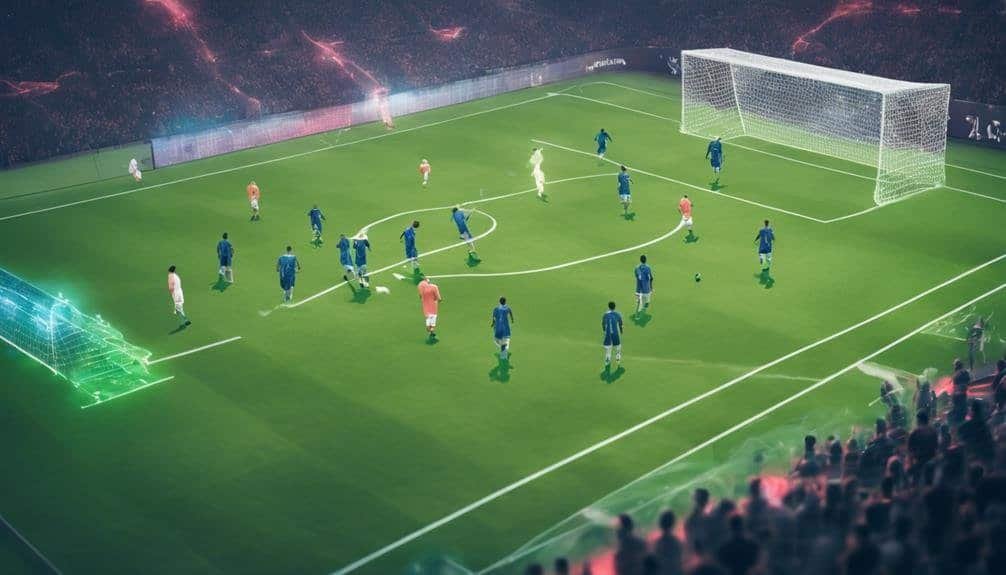AI in Sports: The Ultimate Guide
Have you ever pondered how artificial intelligence (AI) is revolutionizing the world of sports?
From enhancing athlete performance to transforming game strategies, AI's impact is profound.
As you delve into the intricate ways AI is reshaping the sports landscape, you'll uncover a realm where cutting-edge technology meets the competitive spirit of athletics, creating a fusion that is reshaping the very essence of sports as we know it.
Key Takeaways
- AI revolutionizes coaching strategies and player analysis.
- Player tracking tech boosts performance and injury prevention.
- AI elevates fan engagement with personalized experiences.
- Ethical considerations crucial for AI integration in sports.
Evolution of AI in Sports
The evolution of AI in sports has revolutionized the way athletes train, teams strategize, and fans engage with the games. AI coaching strategies have become increasingly prevalent in various sports, providing athletes with personalized training programs and performance analysis. These AI systems can analyze vast amounts of data, including player biometrics, game statistics, and even video footage, to offer insights that human coaches may overlook. By leveraging AI coaching strategies, athletes can enhance their skills, prevent injuries, and optimize their overall performance on the field.
Moreover, AI referee technology has significantly impacted the fairness and accuracy of officiating in sports. With the help of AI-powered systems, referees can make more informed decisions in real-time, reducing the margin of human error. These technologies can assist in detecting fouls, offside plays, and other rule violations with greater precision than traditional officiating methods. By incorporating AI referee technology, sports leagues aim to ensure a more consistent and unbiased application of the rules, ultimately enhancing the integrity of the game.
Impact on Athlete Training
With the integration of AI technologies in sports, athlete training methods have undergone a remarkable transformation, enhancing performance optimization and injury prevention. AI plays a crucial role in athlete recovery by analyzing data from wearables and sensors to provide personalized insights. This data allows coaches and trainers to tailor recovery plans based on individual needs, maximizing the effectiveness of rest periods and reducing the risk of overtraining injuries.
Nutrition optimization is another key area where AI has revolutionized athlete training. By analyzing the nutritional content of foods and tracking athletes' dietary intake, AI can offer personalized meal plans that are tailored to meet specific performance goals. This level of precision ensures that athletes are fueling their bodies with the right nutrients at the right times, leading to improved performance and faster recovery times.
Furthermore, AI has enabled trainers to monitor athletes' progress more effectively, allowing for real-time adjustments to training programs. By analyzing biometric data and performance metrics, AI can identify patterns and trends that may not be apparent to the naked eye, helping trainers fine-tune workouts for optimal results.
Enhancing Performance Analysis
Player tracking technology and real-time data insights have revolutionized the way performance analysis is conducted in sports.
By utilizing AI algorithms to process vast amounts of data, teams can now gain valuable insights into player movements, strengths, and areas for improvement.
This advanced analysis not only enhances coaching strategies but also provides athletes with personalized feedback to optimize their performance on the field.
Player Tracking Technology
Leveraging advanced technology in sports analytics can revolutionize how performance analysis is conducted, providing valuable insights into player movements and strategies. Player tracking technology plays a pivotal role in enhancing player performance through data analytics. By utilizing GPS, accelerometers, and gyroscopes embedded in wearables or installed in stadiums, coaches and analysts can gather immense amounts of data on player movements, speeds, distances covered, and even fatigue levels.
This data is then processed to identify patterns, optimize training programs, and develop strategic game plans. Understanding the intricacies of player performance through data analytics allows teams to make informed decisions that can significantly impact their success on the field.
Real-Time Data Insights
Enhancing player performance through real-time data insights involves harnessing cutting-edge technology to provide immediate and in-depth analysis of player movements and strategies during sports events. Data visualization techniques allow coaches and analysts to interpret complex data quickly, leading to actionable insights.
Real-time performance tracking enables adjustments to be made during games, based on live player statistics. AI-driven coaching insights further enhance the understanding of player performance, offering personalized feedback and strategic recommendations.
AI in Game Strategy Development
Utilizing artificial intelligence in the development of game strategies has revolutionized the way teams analyze data and make tactical decisions on the field. AI offers a wide array of benefits in enhancing game strategy development, ranging from game strategy simulation to AI coaching assistance. Here's how AI is transforming game strategy development:
- Game Strategy Simulation: AI enables teams to simulate various game scenarios based on vast amounts of data, helping coaches analyze different strategies and their potential outcomes before actual gameplay.
- Machine Learning Algorithms: By employing machine learning algorithms, AI can process complex data sets quickly and efficiently, providing insights into opponent behavior, player performance, and strategic patterns.
- Tactical Decision Making: AI empowers teams to make real-time tactical decisions during games by analyzing ongoing data streams and recommending optimal strategies based on the current game situation.
- AI Coaching Assistance: Coaches can leverage AI-driven insights to fine-tune strategies, identify weaknesses in the opponent's gameplay, and provide personalized feedback to players, ultimately enhancing overall team performance.
Player Health Monitoring With AI
AI has revolutionized player health monitoring in sports. It offers advanced tools for injury prevention and performance optimization by analyzing vast amounts of data. AI can identify patterns that indicate potential injury risks, allowing for proactive measures to be taken.
Additionally, AI assists in tailoring training programs to individual athletes. This maximizes their performance potential while minimizing the chances of overexertion.
Injury Prevention Using AI
Player health monitoring through advanced artificial intelligence systems has revolutionized injury prevention strategies in sports. AI algorithms play a crucial role in enhancing athlete health by providing real-time insights and predictive analytics.
Here's how AI is transforming injury prevention:
- Early Risk Detection: AI algorithms analyze vast amounts of data to identify patterns that may lead to potential injuries.
- Customized Training Programs: AI monitoring helps in creating personalized training regimens based on individual biometrics and injury history.
- Fatigue Management: AI systems track athlete workload and fatigue levels to prevent overtraining and reduce the risk of injuries.
- Rehabilitation Guidance: AI-powered tools offer real-time feedback during rehabilitation, ensuring safe and effective recovery protocols.
Performance Optimization Through AI
Enhancing athlete performance through advanced data analysis and real-time monitoring systems has become a game-changer in optimizing player health with the integration of artificial intelligence technology. AI enables personalized training regimens based on performance analysis, reducing the risk of injuries and enhancing overall player well-being.
By tracking vital signs, movement patterns, and workload, AI can identify potential injury risks before they escalate, allowing for targeted interventions and preventive measures. Furthermore, AI algorithms can analyze an athlete's biomechanics and technique, providing valuable insights for coaches and trainers to make informed decisions on training adjustments.
This proactive approach not only enhances performance but also prolongs careers by prioritizing player health and safety through predictive analytics and real-time monitoring.
AI-Powered Injury Prevention
Implementing advanced algorithms and sensor technology can revolutionize the field of sports medicine by significantly reducing the occurrence of injuries among athletes. AI-driven injury prevention strategies leverage data analytics and predictive modeling to enhance athlete safety and performance.
Here are four key ways AI is transforming injury prevention in sports:
- Personalized Training Programs: AI algorithms analyze biomechanical data to create individualized training plans that reduce the risk of overuse injuries and optimize performance.
- Real-time Injury Risk Assessment: Through wearable sensors and AI technology, coaches and medical staff can monitor athletes in real-time, identifying potential injury risks and intervening before they escalate.
- Rehabilitation Guidance: AI-driven athlete rehabilitation techniques provide customized recovery plans based on injury type and athlete-specific data, ensuring a quicker and safer return to play.
- Performance Monitoring: AI-enabled performance analysis tracks movement patterns and technique, identifying areas of improvement to prevent injuries associated with poor form.
Fan Engagement Through AI
Utilizing AI technology in sports not only transforms injury prevention strategies but also revolutionizes fan engagement through personalized and interactive experiences. AI has significantly enhanced fan interactions by tailoring experiences to individual preferences. Through AI algorithms, sports teams and organizations can analyze vast amounts of data to understand fan behavior, preferences, and trends. This data can be used to create personalized content for fans, such as targeted promotions, customized merchandise recommendations, and interactive fan experiences.
One key way AI enhances fan engagement is through personalized experiences. By analyzing data on fan preferences, AI can suggest content that's most likely to resonate with each individual. For example, AI-powered systems can recommend specific game highlights, merchandise, or even interact directly with fans through chatbots to provide real-time updates or information.
Furthermore, AI can create interactive experiences that keep fans engaged before, during, and after games. For instance, AI-powered virtual reality experiences can allow fans to feel like they're part of the action, even if they aren't physically present at the event. Additionally, AI chatbots can provide instant responses to fan inquiries, enhancing the overall fan experience. Overall, AI is revolutionizing fan engagement in sports by providing personalized and interactive experiences that keep fans connected and excited about their favorite teams and athletes.
AI in Sports Broadcasting
AI in sports broadcasting revolutionizes how fans experience games. Real-time data analysis provides insightful statistics instantly, enhancing viewer engagement.
Personalized content delivery tailors the viewing experience, making it more interactive and enjoyable for fans.
Real-Time Data Analysis
Enhancing sports broadcasting through real-time data analysis provides viewers with a deeper understanding of the game's dynamics and player performance. When it comes to real-time data analysis in sports broadcasting, consider the following:
- Real-time performance tracking: Viewers can see player statistics and performance metrics update instantly during the game.
- Predictive analytics: AI algorithms can predict player strategies and potential game outcomes based on real-time data.
- AI-driven injury detection: Through advanced algorithms, potential player injuries can be detected early on.
- Prevention techniques: Coaches and medical staff can use AI insights to prevent injuries by adjusting training or resting players based on real-time data analysis.
Enhanced Viewer Experience
Exploring the realm of sports broadcasting, viewers are offered a more immersive and engaging experience through the application of AI technology, elevating their interaction with the game beyond conventional viewing.
AI enables interactive experiences by providing real-time statistics, player comparisons, and game analyses, enhancing the viewer's understanding and enjoyment.
Immersive technology such as augmented reality (AR) and virtual reality (VR) transports viewers into the heart of the action, allowing them to experience games as if they were on the field themselves.
These advancements revolutionize how sports are consumed, creating a dynamic and personalized viewing experience. By leveraging AI in sports broadcasting, fans can delve deeper into the game, fostering a more profound connection with their favorite sports and teams.
Personalized Content Delivery
Revolutionizing sports broadcasting, personalized content delivery through AI technology tailors the viewing experience to individual preferences, creating a more engaging and immersive interaction with the game. This innovation goes beyond traditional broadcasting methods to offer personalized benefits that enhance your overall sports-watching experience.
Here are four ways personalized content delivery is changing the game:
- Personalized training programs: Receive tailored workout routines and practice regimens based on your favorite sports and fitness goals.
- Cognitive load optimization: AI adjusts the complexity of game analysis and insights to match your cognitive capacity, ensuring an optimal viewing experience.
- Customized nutrition plans: Get personalized nutritional recommendations to support your athletic performance and overall health.
- Biometric data analysis: Track and analyze your biometric data during games to gain insights into your physical performance and health metrics.
Data Analytics and AI
In the realm of sports, the integration of data analytics and AI has significantly impacted performance analysis and strategic decision-making processes. Data visualization techniques play a crucial role in transforming raw data into actionable insights for coaches and athletes. By visually representing complex data sets, trends and patterns become more apparent, aiding in making informed decisions.
Predictive modeling, on the other hand, allows teams to forecast outcomes based on historical data, enabling them to anticipate potential scenarios and plan accordingly.
Machine learning algorithms have revolutionized the way performance forecasting is conducted in sports. These algorithms can analyze vast amounts of data to identify key performance indicators and patterns that human analysis may overlook. By leveraging machine learning, teams can develop more accurate predictions regarding player performance, injury risks, and even game outcomes. This empowers coaches to tailor training programs, adjust strategies, and optimize player performance based on data-driven insights.
AI in Sports Equipment Design
You can explore how AI is revolutionizing sports equipment design by integrating performance-enhancing features like advanced aerodynamics and material innovations.
With customized fit technology, athletes can now have gear tailored precisely to their unique body shapes and playing styles, optimizing comfort and performance.
This innovative approach not only enhances player experience but also pushes the boundaries of what's possible in sports equipment design.
Performance-Enhancing Features
With the integration of AI technology, sports equipment design has seen significant advancements in incorporating performance-enhancing features. Here's a look at how AI is revolutionizing sports equipment:
- Wearable Technology Integration: AI enables the seamless integration of sensors and trackers into sports gear, providing real-time data on performance metrics.
- Performance Tracking Advancements: AI algorithms analyze intricate details like speed, force, and technique, helping athletes fine-tune their skills for optimal performance.
- Material Optimization: AI algorithms optimize material composition to enhance durability, flexibility, and overall performance of sports equipment.
- Customized Design: AI algorithms can personalize equipment design based on individual preferences and biomechanics, ensuring a perfect fit for each athlete.
Customized Fit Technology
AI technology in sports equipment design has revolutionized the concept of customized fit, ensuring unparalleled comfort and performance for athletes. Fit customization through AI algorithms allows for tailored gear that conforms precisely to an athlete's body, reducing discomfort and enhancing mobility.
This personalized fit not only boosts athlete comfort but also plays a crucial role in performance optimization. By minimizing distractions caused by ill-fitting equipment, athletes can focus entirely on their game, leading to improved results.
Moreover, custom-fit technology aids in injury prevention by providing support where needed and reducing the risk of strain or impact-related injuries. In essence, AI-driven fit customization is a game-changer in sports equipment design, prioritizing both athlete well-being and performance excellence.
Virtual Reality and AI Integration
Virtual reality technology has rapidly advanced in recent years, revolutionizing how athletes train and strategize, with the integration of AI opening up new possibilities for enhancing performance. When these two cutting-edge technologies merge, incredible opportunities arise:
- Immersive Virtual Reality Training: Athletes can now simulate game scenarios in a controlled environment, allowing for safer and more efficient training sessions. VR technology enables players to practice specific skills repeatedly without physical strain, leading to accelerated skill development and muscle memory enhancement.
- AI Coaching Assistants: AI algorithms can analyze vast amounts of data collected from virtual training sessions to provide real-time feedback to athletes. These AI coaching assistants can identify areas of improvement, suggest personalized training plans, and even predict opponents' strategies based on historical data, giving athletes a competitive edge.
- Enhanced Decision-Making Skills: By immersing athletes in realistic virtual environments, VR combined with AI can help players enhance their decision-making skills under pressure. Athletes can experience high-stakes situations repeatedly, fine-tuning their reactions and strategic thinking.
- Injury Prevention and Rehabilitation: Virtual reality coupled with AI can aid in injury prevention by analyzing an athlete's movements for potential injury risks. Moreover, VR simulations can be used in rehabilitation programs to track progress and motivate athletes during the recovery process.
The integration of virtual reality and AI in sports heralds a new era of training, coaching, and performance enhancement, pushing the boundaries of what athletes can achieve.
AI in Recruiting and Scouting
Incorporating artificial intelligence into the process of recruiting and scouting in sports revolutionizes talent identification and player assessment methodologies. By leveraging AI technologies, teams can now delve deeper into recruiting analytics and player evaluation processes with unprecedented precision.
Recruiting analytics powered by AI sift through vast amounts of data to identify patterns and trends that may have previously gone unnoticed. These analytics tools can analyze player statistics, performance metrics, and even social media behavior to provide valuable insights into a player's potential fit within a team.
Player evaluation has also been significantly enhanced through AI in scouting. Advanced algorithms can assess player performance across various parameters, helping teams make more informed decisions when scouting for new talent. By incorporating AI-driven player evaluation tools, teams can streamline the scouting process and identify promising prospects more efficiently.
Furthermore, AI can assist in predicting player development trajectories, allowing teams to make strategic decisions based on future performance potential. This predictive analysis enables teams to optimize their recruitment strategies and invest resources more effectively in developing talent.
Ethics of AI in Sports
The ethical implications surrounding the integration of artificial intelligence into the realm of sports present a complex and multifaceted landscape that demands careful consideration and evaluation. When delving into the ethical considerations of AI in sports, several critical points emerge:
- AI Bias Assessment: One of the key ethical concerns in the implementation of AI in sports revolves around the potential for bias in decision-making processes. As AI systems are trained on historical data, there's a risk of perpetuating existing biases, particularly regarding race, gender, or socioeconomic status. Rigorous assessment mechanisms must be put in place to identify and mitigate bias in AI algorithms.
- Fair Play Considerations: The introduction of AI technologies raises questions about maintaining fairness and integrity in sports competitions. Issues such as the use of AI to gain an unfair advantage or manipulate outcomes need to be addressed to uphold the principles of fair play. Striking a balance between using AI for performance enhancement and preserving the spirit of sportsmanship is crucial.
- AI Implementation: Implementing AI in sports necessitates transparent protocols and guidelines to ensure ethical standards are met. Clear policies on data privacy, consent, and accountability must be established to govern the use of AI technologies across various sporting disciplines.
- Societal Impact: Beyond the sporting arena, the societal impact of AI in sports can't be overlooked. Ethical considerations extend to how AI influences fan engagement, athlete well-being, and the broader cultural significance of sports. It's imperative to assess these implications to ensure that AI aligns with societal values and ethical standards in sports.
Future Trends in AI and Sports
Considering the rapid advancements in technology and the evolving landscape of sports, future trends in AI and sports are poised to revolutionize the way athletes train, compete, and engage with fans. One of the key trends on the horizon is the integration of AI in sports betting. AI algorithms can analyze vast amounts of data, including player performance, weather conditions, and historical trends, to provide more accurate predictions. This not only enhances the betting experience for fans but also helps sportsbooks in setting odds more effectively.
Another significant trend is the utilization of AI in virtual reality training. By combining AI with virtual reality simulations, athletes can experience game-like scenarios, receive real-time feedback, and work on improving their skills in a controlled environment. This type of training can enhance decision-making abilities, improve reaction times, and reduce the risk of injuries.
Furthermore, AI is expected to play a more prominent role in enhancing fan engagement. Through personalized recommendations, AI can offer fans tailored content based on their preferences, viewing habits, and favorite teams. This can lead to a more immersive and interactive experience for fans, fostering stronger connections between them and their favorite sports.
AI Integration in Sports Leagues
With AI making significant strides in sports technology, its integration in sports leagues is reshaping the way teams strategize, analyze performance, and engage with fans. Here's why AI integration in sports leagues is a game-changer:
- Enhanced Performance Analysis: AI algorithms can process vast amounts of data to provide in-depth performance analysis for teams. From player statistics to game strategies, AI offers valuable insights that can help teams make informed decisions.
- Real-time Coaching Assistance: AI-powered tools can provide real-time feedback to coaches during games, helping them make instant adjustments based on analyzed data. This technology enhances coaching strategies and improves in-game decision-making.
- Fan Interaction: AI enables sports leagues to offer personalized fan experiences through chatbots, interactive apps, and tailored content. By analyzing fan preferences and behavior, leagues can engage with their audience in more meaningful ways.
- Sponsorship Opportunities: AI helps sports leagues identify sponsorship opportunities by analyzing fan demographics, engagement levels, and viewership data. This data-driven approach allows leagues to offer targeted sponsorship packages that deliver value to both sponsors and fans.
Conclusion
In conclusion, AI in sports has revolutionized the way athletes train, analyze performance, strategize, monitor health, recruit talent, and even navigate ethical considerations.
As technology continues to advance, the integration of AI in sports leagues will only become more prevalent.
It's no coincidence that the future of sports is being shaped by artificial intelligence, offering a glimpse into a new era of innovation and excellence on the field.







